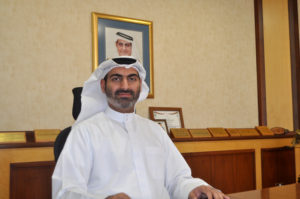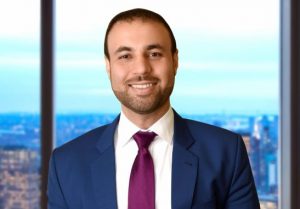In the GCC, the reducing volume of project awards has been a major issue affecting the regional construction industry, but it is not the only one. A market outlook study by Deloitte states that due to the lower number of projects and tightened budgets generally, there is an increased level of competition across the industry to secure those few contracts that are still being awarded, and this has translated into downward pricing pressure, i.e. reduced margins when preparing project budgets or estimates. The past year certainly presented positive macroeconomic drivers for construction that include population growth, diversified economic growth, a growing labour force, and mega events such as Vision 2030 and Expo 2020, in addition to a strong tourism drive. But will 2018 represent an improvement over 2017?
Five top industry leaders present their views about the same:
Abdulrahman Khansaheb, managing director, Khansaheb
 Strategies for 2018 – We intend to continue investing in our home market, the UAE, as well as steadily expanding our footprint across the region. Khansaheb Industries has a steady pipeline of projects and we will continue to approach both end-users and consultants to strengthen the business through more regional orders. We seek to grow organically and one of the ways in which we will do this is by expanding our manufacturing capabilities. Hence, we are opening a new facility in Jebel Alis Technopark in Q1 2018, which will increase our light manufacturing capacity for products such as non-metallic air ducts.
Strategies for 2018 – We intend to continue investing in our home market, the UAE, as well as steadily expanding our footprint across the region. Khansaheb Industries has a steady pipeline of projects and we will continue to approach both end-users and consultants to strengthen the business through more regional orders. We seek to grow organically and one of the ways in which we will do this is by expanding our manufacturing capabilities. Hence, we are opening a new facility in Jebel Alis Technopark in Q1 2018, which will increase our light manufacturing capacity for products such as non-metallic air ducts.
Focus trend – Supply will be a critical factor determining value of property in the region, both residential and commercial. With more units set to be introduced in 2018 on the back of increased construction activity ahead of Expo 2020, this would pressurise real estate prices. Yet, prime locations in Dubai still offer attractive yields to investors and demand for units within these areas has remained stable. Levels of demand will also be influenced by other factors such as employment growth, business conditions and oil price volatility, as both play a role in determining in investor sentiment when putting cash into the real estate market. It is highly unlikely that we will see any inflation in house prices, given the current liquidity challenges in the market. It seems as though, overall, the market will continue to bottom out in 2018.
Past year performance – 2017 was a very positive year for us with a consistent flow of projects, through which we were able to grow our business. We are confident that 2018 will be an even better year because of our expansion as well as the new products we will introduce in the market. In 2017, we acquired an exclusive license to manufacture Spiralite in the UAE. This will be a critical HVAC component for domestic, commercial, and industrial buildings in order to meet sustainable targets, as it is an energy efficient ductwork system which can offer significant energy savings of up to 58%.
Jyotsna Hegde, president, Sobha Group
 Strategies for 2018 – We do have some plans for a masterplan project catering to the mid-end segment. The project will not be in our flagship Sobha Hartland; itll be another location. Were in talks, and at some point, well finalise. But were not yet ready to make an official announcement. Theres something in the pipeline, but we dont want to disclose things unless everything is confirmed.
Strategies for 2018 – We do have some plans for a masterplan project catering to the mid-end segment. The project will not be in our flagship Sobha Hartland; itll be another location. Were in talks, and at some point, well finalise. But were not yet ready to make an official announcement. Theres something in the pipeline, but we dont want to disclose things unless everything is confirmed.
Focus trend – The general market is on an upswing; things are changing for the better. Weve seen that 2017 has been definitely better than 2016; the second half has been extremely encouraging. The whole response from the market has been very exciting in the last few months. Dubai is one of the best places in the world for people to live in, and to invest in. Demand for quality real estate is definitely going up and contrary to what the market has been talking about, supply is not enough. Theres only so much being built. The next 10 years are going to be a very important time for Dubais economy, especially real estate.
Past year performance – 2017 has been an exciting year for us. Weve launched a number of new projects as well. Weve got the new Gardenia villas, and launched two new buildings keeping in line with the market demands. We had a good year because the construction has been going well; our project and infrastructure is fully funded, and everything is in place. Were able to progress with the construction full speed.
Farhad Azizi, CEO, Azizi Developments
 Strategies for 2018 – Azizi Developments will remain construction-focused in 2018 and the first six months will see increased project deliveries and launches of new projects in prime locations in the emirate. We will also be consolidating on the success of our two key projects in 2017 – Azizi Riviera in Meydan One and Azizi Victoria in Mohammed bin Rashid City District 7 and focusing on their expansion, with first deliveries expected by the end of 2018 for Azizi Riviera. 2018 focus will also be on diversity in our developments, that will have Azizi expand on its recent multiple launches of lifestyle communities such as Azizi Riviera and Azizi Victoria.
Strategies for 2018 – Azizi Developments will remain construction-focused in 2018 and the first six months will see increased project deliveries and launches of new projects in prime locations in the emirate. We will also be consolidating on the success of our two key projects in 2017 – Azizi Riviera in Meydan One and Azizi Victoria in Mohammed bin Rashid City District 7 and focusing on their expansion, with first deliveries expected by the end of 2018 for Azizi Riviera. 2018 focus will also be on diversity in our developments, that will have Azizi expand on its recent multiple launches of lifestyle communities such as Azizi Riviera and Azizi Victoria.
Focus trend – The regional real estate sector will continue to show resilience despite market pressures and we expect to see healthy demand in 2018, along with a surge in off-plan projects in some countries in the region, like the UAE. We will also see a demand for premium real estate with good return on investment (ROI) in some markets. To respond to this demand, developers will remain focused on delivering projects in prime locations with competitive payment plans. Overall, we also expect to see more regulations introduced that will benefit the real estate sector and encourage even more people to consider buying versus renting a home.
Past year performance – We witnessed peaked demand from GCC investors and individual buyers in 2017 and conceptualised and developed unique projects across the city to drive this demand, including our two mega projects Azizi Riviera in Meydan One and Azizi Victoria in Mohammed bin Rashid City District 7. Azizi expanded its strategy in 2017 and began offering a 360? diversified lifestyle experience from residential clusters to mega urban developments, to buyers and investors. Our projects are located around the finest shopping malls, education facilities, recreational centres, and healthcare amenities. Commencing the year, from 20 projects we have concluded 2017, with more than 100 projects in various stages of development with a total portfolio of over AED20bn. Furthermore, we are very proud to say that we have witnessed year-on-year sales growth of 200% across our properties in Dubai.
Craig Plumb, head of research MENA, JLL
 Focus trend – Real estate markets are influenced by a mix of local and regional issues. While individual sectors are at different positions on their cycle in different cities across the region, the introduction of value-added tax (VAT) is a common factor that will influence all sectors in the UAE and Saudi Arabia in 2018. VAT is a key strategy in the plans of these countries to raise additional government revenue and help diversify their economies away from their current dependence upon the oil sector. While VAT is basically a pass through tax paid by the end purchaser of a product or end consumer of a service, it will have a significant impact upon the real estate industry in 2018. The most immediate effects will include uncertainty and delays in invoicing and receipt of payments, that will negatively impact cash flows in all sectors of the economy. The long-term impacts of VAT are likely to include a reduction in profit margins for those contractors, developers, and owners who are not able to pass on the full impact of the 5% increase in their costs. As residential rents are exempted from VAT in both KSA and the UAE (with the sale of new residential supply zero rated in the UAE), VAT is likely to result in a shift of attention from the commercial to the residential sector of the market.
Focus trend – Real estate markets are influenced by a mix of local and regional issues. While individual sectors are at different positions on their cycle in different cities across the region, the introduction of value-added tax (VAT) is a common factor that will influence all sectors in the UAE and Saudi Arabia in 2018. VAT is a key strategy in the plans of these countries to raise additional government revenue and help diversify their economies away from their current dependence upon the oil sector. While VAT is basically a pass through tax paid by the end purchaser of a product or end consumer of a service, it will have a significant impact upon the real estate industry in 2018. The most immediate effects will include uncertainty and delays in invoicing and receipt of payments, that will negatively impact cash flows in all sectors of the economy. The long-term impacts of VAT are likely to include a reduction in profit margins for those contractors, developers, and owners who are not able to pass on the full impact of the 5% increase in their costs. As residential rents are exempted from VAT in both KSA and the UAE (with the sale of new residential supply zero rated in the UAE), VAT is likely to result in a shift of attention from the commercial to the residential sector of the market.
Simon Townsend, head of valuations, advisory and consulting, CBRE Middle East
 Focus trend – While e-commerce is still at the nascent stage of development in the wider Middle East region, it is clear that this trend will impact the regional real estate landscape. In the wake of online shopping, major structural changes will be required to help elevate the infrastructure and service delivery within bricks and mortar stores. This will also drive a wave of development in the industrial and logistics sphere, with new distribution facilities being developed around major transportation nodes to ensure faster delivery times, such as the Sheikh Maktoum International Airport (Dubai South), where IKEAs new warehouse has already been delivered. In terms of the mall design, an increase in on-location storage facilities and new click and collect areas will also likely be required to be able to accommodate rising sales from online platforms. As a result, the traditional store may start to take on a slightly different role, which could bring rise to an increase in the number of concept stores, and other new ways for retailers to connect with customers and elevate the retail experience. This trend is increasing the demand for high-performance logistic hubs, which is providing a further investment catalyst with international operators considering build to suit or sale and leasebacks across the region.
Focus trend – While e-commerce is still at the nascent stage of development in the wider Middle East region, it is clear that this trend will impact the regional real estate landscape. In the wake of online shopping, major structural changes will be required to help elevate the infrastructure and service delivery within bricks and mortar stores. This will also drive a wave of development in the industrial and logistics sphere, with new distribution facilities being developed around major transportation nodes to ensure faster delivery times, such as the Sheikh Maktoum International Airport (Dubai South), where IKEAs new warehouse has already been delivered. In terms of the mall design, an increase in on-location storage facilities and new click and collect areas will also likely be required to be able to accommodate rising sales from online platforms. As a result, the traditional store may start to take on a slightly different role, which could bring rise to an increase in the number of concept stores, and other new ways for retailers to connect with customers and elevate the retail experience. This trend is increasing the demand for high-performance logistic hubs, which is providing a further investment catalyst with international operators considering build to suit or sale and leasebacks across the region.

